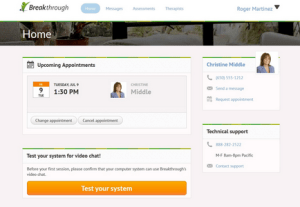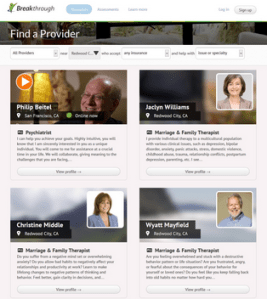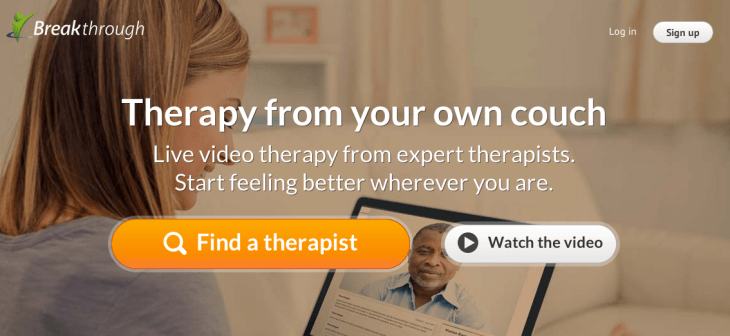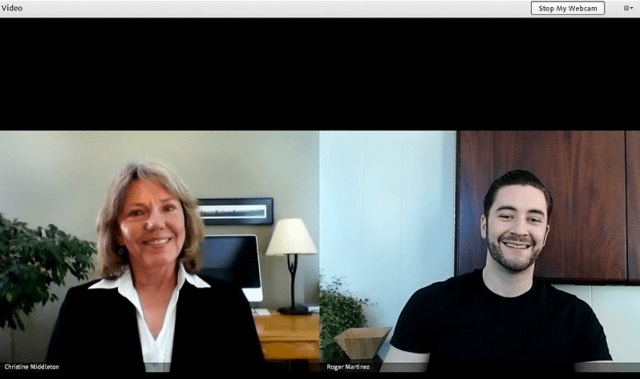Today, 67 million Americans are living with some sort of diagnosable mental illness, yet nearly 35 percent receive inadequate care and 50 percent receive no treatment whatsoever. For one of the biggest problems in healthcare, it’s also one of the least discussed. The reasons range from the stigma that comes with mental illness and its cost to the poor access and low distribution of quality care providers.
Breakthrough launched in 2009 to help address the lack of adequate care by helping to bring, affordable mental health therapy online. Today, the startup is announcing that it has raised $5 million in series A financing led by The Social+Capital Partnership, with participation from First Round Capital and Great Oaks Venture Capital.
While an increasing number of venture firms are beginning to dip their toes into digital health, Social Capital has emerged as one of the early leaders in the investment community, with Rock Health’s industry report recently naming the firm the most active digital health investor.
For Breakthrough, this follows the $1 million in seed capital it raised last year from Keith Rabois, Kapor Capital, Morado Ventures and Practice Fusion co-founder Matt Douglass, and will allow it to ramp up its engineering and sales teams and expand its network of credentialed therapists.
 It also marks critical validation for the company’s approach to combining modern “tele-health” tech with evidence-based healthcare practices, allowing patients to peruse profiles of licensed therapists, view video introductions, book appointments and get live care via videoconferencing. When one considers that the majority of small towns in the U.S. don’t have psychiatrists or access to mental health care practices, this is where Breakthrough can make a difference.
It also marks critical validation for the company’s approach to combining modern “tele-health” tech with evidence-based healthcare practices, allowing patients to peruse profiles of licensed therapists, view video introductions, book appointments and get live care via videoconferencing. When one considers that the majority of small towns in the U.S. don’t have psychiatrists or access to mental health care practices, this is where Breakthrough can make a difference.
By offering a HIPAA-secure teleconferencing and video network, the startup can begin to bring these “tele-shrinks” into patients’ homes via its virtual therapy network, literally bringing in-home care to regions that have largely remained uncovered in this critical area of health care. And, to that point, if you cringe slightly at the thought of a “telepsychiatrist,” you’re probably not alone.
That’s why founder and CEO Mark Goldenson believes that Breakthrough’s biggest differentiator — and, he hopes, a point of assurance for patients — is that the platform actually accepts insurance. Today, most other online therapy services ask their users to pay out-of-pocket, he says, which, in a country where health care is already unaffordable, ends up pricing out a lot of potential customers.
According to Goldenson, Breakthrough now covers 2 million members of health plans, including Blue Shield of California and Magellan. Though this makes it the widest coverage of any telepsychiatry service, he says, it will be critical for Breakthrough to continue to add support from a laundry list of insurance providers if it hopes to hit real scale.
Beyond insurance coverage and access, both the stigma around mental health itself and the belief that online care is less effective than its in-person equivalent have been major barriers to mental health therapy — online and off. But the founder believes that by offering live video therapy to patients, Breakthrough can help remove some of the most significant barriers that stand in the way of progress, particularly by helping people search for, book and pay for mental health therapy online.
 The case has also been strengthened of late by research from the National Institute of Mental Health, the Department of Veterans Affairs and Johns Hopkins, which has asserted that telehealth care can be just as effective as in-person care. In fact, Goldenson tells us, a landmark study last year found that live video treatment of 98,000 veterans with mental illnesses was able to reduce hospitalization rates (and duration of their stays) by 25 percent.
The case has also been strengthened of late by research from the National Institute of Mental Health, the Department of Veterans Affairs and Johns Hopkins, which has asserted that telehealth care can be just as effective as in-person care. In fact, Goldenson tells us, a landmark study last year found that live video treatment of 98,000 veterans with mental illnesses was able to reduce hospitalization rates (and duration of their stays) by 25 percent.
Of course, that percentage needs to go up, but one can imagine the potential effect this could have in the future, as more and more of the nation’s respected therapists and psychiatrists begin to jump on the bandwagon. To incentivize therapists and help catalyze that very change, Breakthrough also now offers a suite of practice-management tools for care providers.
Therapists can use the platform to manage scheduling, patient messaging and customer support — and, coming soon, Goldenson says, insurance claim filing and payment processing, as well.
With Americans spending $135 billion each year on mental health care, Goldenson believes that Breakthrough has a big opportunity to help reduce those costs, while still providing value for care providers. To that point, the Breakthrough founder is willing to venture that this space will eventually produce a billion-dollar company, and now that it has some financial fuel to begin scaling, its name might be in the running.

